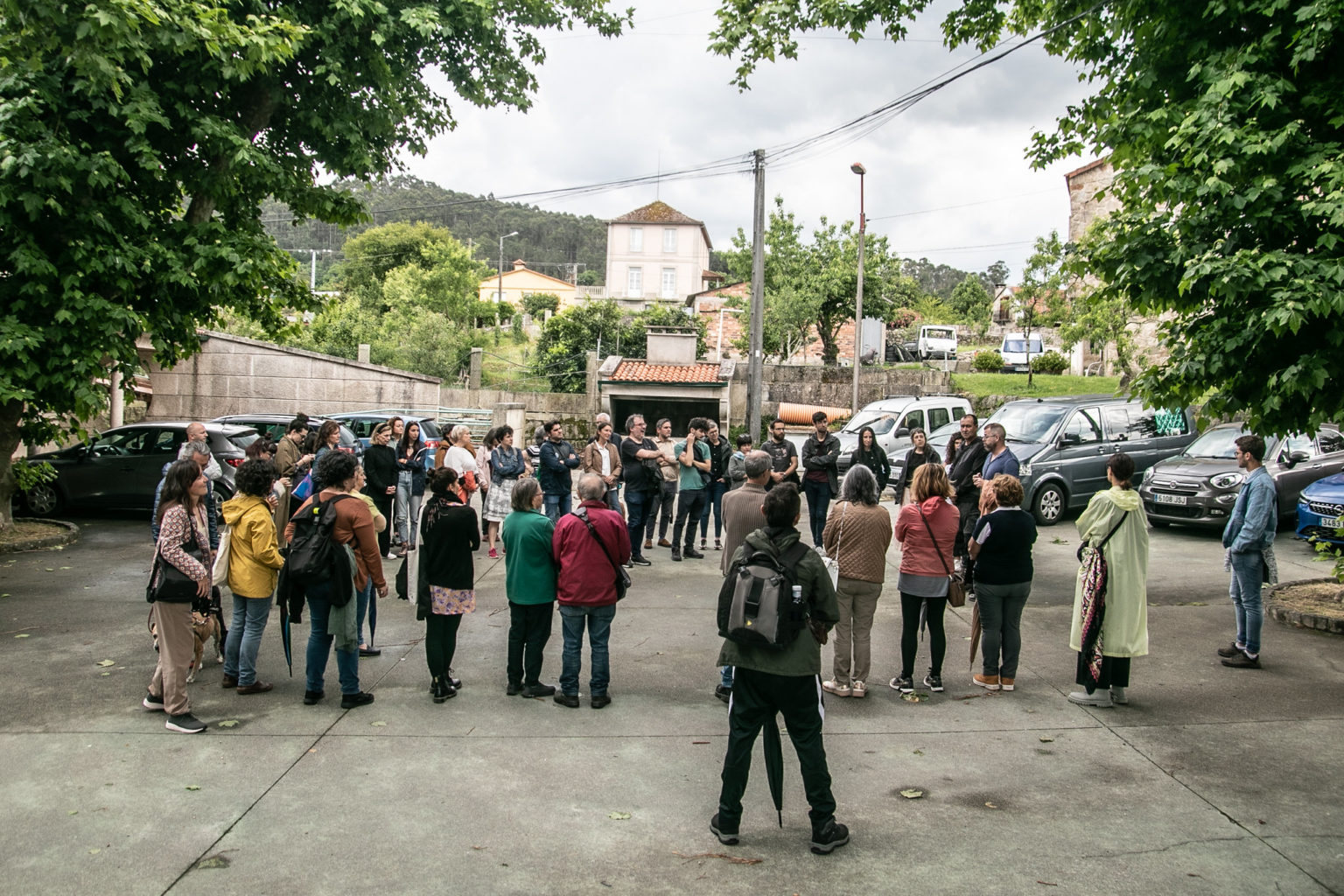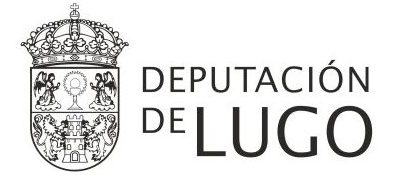Thinking about the encounter while you do it

At the end of May we organised the first European meeting of 'Art as a meeting space' and the Communal Route in Galicia.
To read the text in Galician click here.
At the end of May, Concomitentes organised the European meeting Art as a meeting space and the Ruta Comunal in Santiago de Compostela and on the Couso neighbourhood mountain (Gondomar, Pontevedra). With these public sessions we wanted to understand how communities can co-create together and how, in order to do so, it is necessary to meet. The sessions had to revolve around the concept of "encounter", without being an abstract exercise, so we thought about the encounter while celebrating it together.
We all know about the capacity of making together, but how we can contribute to intensify it or how art can help communities to come together to imagine new processes, products or to manage a mountain, a work of art or a heritage legacy in common. Throughout 2023 and 2024, in the framework of the European project Art Living Lab for Sustainabilitywhich financed this activity, we are going to develop three participatory projects to help raise awareness of the capacity of communities to self-manage their territory, to reconnect with their immediate territory. The first step for this is to meet each other. Knowing what some need, what others want, or what is at stake, an encounter that is a deep listening. And here art helps to put the body, to increase sensitivities and to awaken other ways of approaching reality, which had often been silenced.
The European project 'Art Living Lab for Sustainability' is funded by the European Commission through Creative Europe and is led by Concomitentes, together with partners from the European Commission and the European Commission. Nieuwe Opdrachtgeversthe Société de Nouveaux Commanditaires and the University of Santiago de Compostela.

European cultural meeting in Santiago
On 25 May at Zona C in Santiago de Compostela, an open conversation began with the artist of the Concomitentes project, Legado Cuidado, Carme Nogueira; Valérie CudelShe is a mediator of the European 'Water Commons' project in France and a member of La Société des Nouveaux Commanditaires; Thérèse Legierseart curator and coordinator of De Nieuwe Opdrachtgevers in Belgium; and Fran Quirogatransdisciplinary researcher and coordinator of Concomitentes. The speakers delved into the power of art to generate meeting places that facilitate citizen agency, underlining the impact beyond the production of an artistic work.
Many artistic practices are incursions that aim to unravel what is happening in a territory, to unveil contemporary injustices or to help communities to read their processes. Art thus plays a fundamental role in the production of this individual and collective subjectivity, contributing to the creation of other ways of seeing and feeling the world, achieving a relevant but undervalued role in the experimentation of methodologies, protocols, other ways of doing things and common decisions.
Considering the sensitive as an encounter of the multiple, in this exchange 'Art as a space of encounter', it was concluded that in the processes of citizen institution, political imagination is also art. This sensory experience, in order to be truly useful, must be accompanied by an ethical framework of commitment that frames it and a political commitment that broadens the scope of an artistic intervention.
In short, a workshop was generated, spun from the conversation of these voices, which went beyond the European project, learning and debating together from their own practice.
Communal route: Exploring the territory of 'Common Land
The communal route through the Couso Mountains brought together some sixty people from different countries, territories, experiences and backgrounds. Neighbours from the local environment, artists, mediators, academics and other people working in the field of art, culture and heritage, who lived together with the community members of Couso. It was a very enriching space for the body and the spirit because of its transversality in addressing the social conflicts of the places and the development of the territories. In addition, art, mediation and artistic creation itself were positioned as a tool for transformation and social innovation with the communities; the communal forests as a legal and organisational power of the past, present and future, and the methodologies of accompaniment and monitoring of projects such as this one by the field of academia.
On Friday 26th May we visited the Montes Vecinales de Couso with the president of the Community of Montes, Xosé ArauxoThe group was accompanied by a guided and commented walk around the main projects that are being developed by the community of montes. We were able to visit, accompanied by a beautiful downpour of water that left us all soaked, the edible forest located in the upper part of the mountain, one of the pieces that represent the diversity and multifunctionality of this territory, and we peeked into the amphibian refuge for breeding, although we could not see it up close, because the storm started.

We continued the activity in the Casa Vecinal de Couso, a resource for the community promoted and made by the community members themselves. Once there, David SotoProfessor at the University of Santiago de Compostela, shared his knowledge of community forests and their value as a way of managing the land, the territory and social cohesion and emancipation. A very powerful tool for this uncertain future that we have ahead of us as a society and for which the legal tool of communal forests can be an innovative solution for land management, fire prevention, food self-sufficiency and the generation of quality local jobs and the protection of biodiversity.
On the other hand, Benito BurgosThe coordinator of the Culture and Ruralities programme and Deputy Director General for Cultural Cooperation with the Autonomous Communities of the Ministry of Culture and Sport, presented the different programmes promoted by the Ministry for the diversification and implementation of cultural production in rural territories throughout Spain. A tool that makes it possible to implement projects rooted in the different rural territories of a cultural, artistic and heritage nature, projects located in and connected to local communities.
To conclude Natalia BalseiroThe European project's mediator in Spain, Common Ground', developed in Montes de Couso, he shared some of the details of the mediation process that has been taking place since March within the framework of this project, as well as the different processes of thought and practice that are being developed with the community of montes and neighbours of Couso in order to imagine together a common desire. They talked about how, in a mediation process like this one, it is necessary to get rid of the individual desire to talk about the needs of the woodland community, the neighbourhood, the territory, among others. And, from there, to imagine solutions, problems or dilemmas that allow us to move forward, through a work of art or an artistic intervention, in the territory.
The food, the party and the performance could not be missing in an art meeting, so we could enjoy in the Casa Vecinal de Couso, a performance by Petra Porterwho led us to desire, a tool that moves worlds and bodies, and we ended, as it could not be otherwise, with the movement of our bodies thanks to the Charanga Va de Baile.
A finais de maio organizamos dende Concomitentes o Encontro Europeo de Arte as a meeting space and the Roteiro Comunal in Santiago de Compostela and in Couso (Gondomar, Pontevedra). With these public sessions we wanted to understand how communities can co-create together and how they need to meet. The sessions had to revolve around the concept of "meeting", but it could not be an abstract exercise, it had to be done, we needed to think about the meeting while we were doing it.
We all know about the capacity to work together, but the question is how can we contribute to intensify this, or can art help communities to come together to imagine new processes, products or to jointly manage a mountain, a work of art or a heritage legacy. Throughout 2023 and 2024 in the framework of the European project "Art Living Lab for Sustainability, which financed this activity, we are going to develop three participatory projects to help raise awareness of the capacity of communities to self-manage their territory, to reconnect with their immediate territory. For this, the first step is to meet each other. To know what some need, what others want, or what is at stake, a meeting that is a profound choice. And here art helps to place the body, to increase sensitivities and to awaken other ways of approaching reality, which on many occasions would remain silenced.
A actividade enmárcase dentro do proxecto europeo Art Living Lab for Sustainability‘, financed by the European Commission through Creative Europe and is led by Concomitants, coa company, as partners, de Nieuwe Opdrachtgevers, La societé de Nouveaux Commanditaires e a Universidade de Santiago de Compostela.

In Santiago, European cultural meeting
On 25 May at Zona C in Santiago de Compostela, an open conversation began with the artist of the Concomitentes project, Legado Coidado, Carme Nogueira; Valérie Cudel, mediator of the European project 'Water Commons' in France and member of the Société deas Nouveaux Commanditaires; Thérèse Legierse, art curator and coordinator of De Nieuwe Opdrachtgevers in Belgium; and Fran Quiroga, transdisciplinary researcher and coordinator of Concomitentes. The speakers delved into the power of art to create meeting places that facilitate community involvement, sublimating the impact beyond the production of an artistic work.
Many artistic practices are incursions that aim to unravel what happens in a territory, to unveil contemporary injustices or to help communities to be able to read their processes. Art thus plays a fundamental role in the production of this individual and collective subjectivity, contributing to create other ways of seeing and feeling the world, achieving a relevant but undervalued role in the experimentation of methodologies, protocols, other ways of doing and common decisions.
Considering the sensitive as a meeting of the multiple, in this exchange 'Art as a meeting space', we concluded that political imagination is also art. This sensorial experience, in order to be really useful, must be accompanied by an ethical framework of commitment that frames it and a political commitment that broadens the scope of an artistic intervention.
In short, a workshop was held, based on the conversation of these voices, which went beyond the European project, learning and debating together from their own practice.
Roteiro comunal: Exploración do territorio de 'Terra común
Sixty people from different countries, territories, experiences and knowledge came together at the meeting; Couso residents, artists, mediators, academics and other people who work in the field of art, culture and heritage together with the Couso residents.
A tremendously enriching space for the body and the spirit because of its transversalidade When addressing the social conflicts of the places, the development of the territories, art as a tool for transformation and social innovation, the processes of mediation with the community and the processes of artistic creation with the communities, the Montes Comunais as a legal and organisational power of the past, the present and the future and the methodologies of accompaniment and monitoring of projects like this by the field of academia.
On Thursday 26th May we visited the Couso Mountains with the president of the Community of Mountains. Xosé Arauxo who made a guided and commented walk around the main projects that are being developed from the community of Montes. We were able to visit, accompanied by a very heavy downpour of water that left us all soaked, the edible forest located in the upper part of the mountain, one of the pieces that represent the diversity and multifunctionality of the Couso Mountains, we looked at the amphibian refuge for breeding, where we could no longer go down due to the rain and the storm.

We continue in the Casa Veciñal de Couso, a resource for the community driven and made by the community members of Couso themselves, with David Soto, professor at the University of Santiago de Compostela, who shared with the audience his knowledge about community forests and their value as a way of managing the land, the territory and social cohesion and emancipation. A very powerful tool for this uncertain future that we have ahead of us as a society and for which the legal tool of community forests can be an innovative solution for the management of the common territory, fire prevention, food self-sufficiency and the generation of quality local jobs and the protection of biodiversity.
Por outra banda Benito Burgos, coordinator of the Culture and Ruralities programme and Deputy Director General for Cultural Cooperation with the Autonomous Communities of the Ministry of Culture and Sport, presented different programmes that are being promoted by the Ministry of Culture for the diversification and implementation of cultural production in rural territories throughout Spain, a tool that allows the implementation of projects rooted in the different rural territories of a cultural, artistic and heritage nature, projects located in and connected with local communities.
To finish off Natalia Balseiromediator of the project Terra Común that we are developing in the Couso Mountains, shared the mediation process that has been taking place in Couso since March, within the framework of this project, as well as the different processes of thought and practice that are being developed with the community of Couso's forests and local residents in order to be able to imagine together a common desire for Couso. It is clear how, in a mediation process like this, we have to get rid of taste, to talk about the needs of the community of woodlands, the local community, the territory, etc. and, from there, to imagine solutions, problems or dilemmas that allow us to move forward, through a work of art or an artistic intervention, in the territory.
We could not miss the food, the party and the performance in a meeting of art, so we can know, in the Casa Veciñal de Couso, the performance by Petra Porter, who led us to desire, a tool that moves worlds and bodies, and we finish, as it could not be otherwise, with the movement of our bodies thanks to the brass band Vai de Baile.











 Concomitentes
Concomitentes 